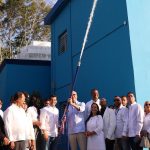Organizations linked to the environment criticized the approval, in the Constitution and Justice Committee (CCJ) of the Chamber of Deputies this week, of the Bill 2.168/21which allows the felling of native vegetation in permanent preservation areas (APPs) for irrigation infrastructure works and animal drinking fountains, modifying the Brazilian Forest Code.

Approved by the CCJ by 37 votes to 13, the text has already been approved by the Environment and Agriculture committees. It must now go to the plenary of the Chamber.
“The measure represents a significant setback in environmental protection in Brazil by facilitating deforestation in APPs and, therefore, threatening the country’s water and food security and biodiversity. Furthermore, it increases the country’s vulnerability to extreme weather events, which are becoming more common each year,” said the Forest Code Observatory, which brings together 45 entities linked to environmental issues, in a statement.
The public notice states that the project prioritizes private economic interests to the detriment of the public interest “of a vital common good – water”. For the Observatory, the APPs guarantee the quality and quantity of water that supplies cities and rural communities, in addition to the sustainability of agricultural production and reducing the effects of extreme weather events.
“Such evidence is exhaustively proven by scientific studies and technical analyses by organized civil society,” the note adds.
The environmentalists’ demonstration argues that the approval of the project ignores the climate disaster in Rio Grande do Sul (RS) – “which even had the approval of a state law similar to that approved by the Chamber of Deputies” – and the water crisis in the Amazon region, “where the reduction in water flow due to the silting of rivers has compromised the water supply for the populations”.
Agribusiness
The rapporteur of the project in the Chamber’s CCJ, deputy Coronel Fernanda (PL), explained in the session that the measure is important for agribusiness, reducing bureaucracy and facilitating irrigation in grain production and animal hydration.
“Irrigation is necessary for the fields to continue producing. We are experiencing a period of changing seasons and, in some regions, there is a lack of rain. With this project, we will give farmers, especially small producers, the possibility of storing rainwater,” the parliamentarian highlighted.
Colonel Fernando added in his report that the project states that infrastructure works in protected areas must comply with regulations on water resources. The project also states that the legislative change is important to “guarantee Brazil’s food and water security.”

















